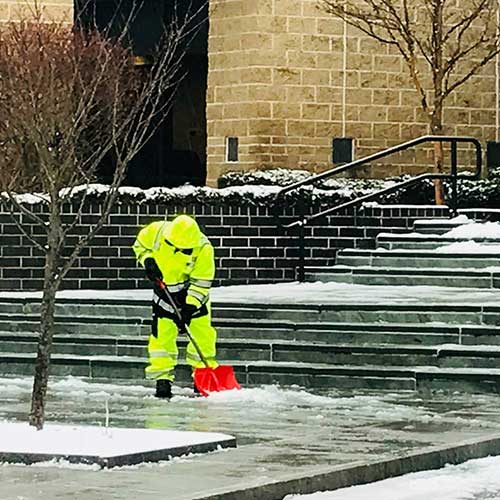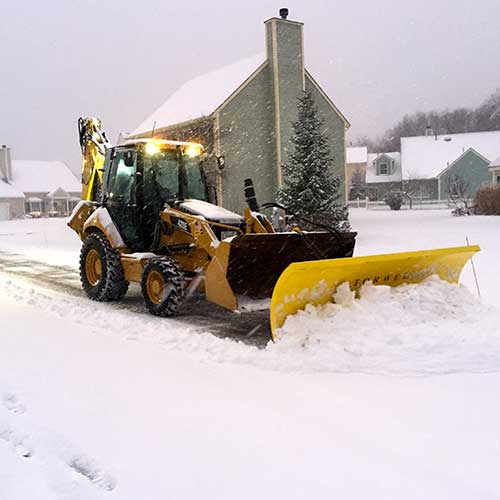Premier Dedham
Snow Removal Company
Looking for a Dedham Snow Removal Company?
Are you a Business Owner? Property Manager? Or maybe someone just looking for more information on a top notch Dedham snow removal company.
You’re in the right place…
DO YOU HAVE THESE PROBLEMS:
• Not happy with existing snow plowing contractor?
• New business owner?
• Accepting new bids for existing property?
• In need of immediate snow removal services?
• Need bigger equipment or team to manage your properties?
MF Landscape & Design‘s commercial snow removal services have helped thousands of business owners, property managers, and other individuals in Dedham, MA and the surrounding communities plow, sand, salt, shovel, and maintain their parking lots, walkways, and stairs. We understand the liability and know how to prevent potential problems for you, your customers, and your employees.
After some research, we’re confident you’ll find us to be the right ice and snow management company to handle your snow removal needs.
Why Choose
MF Landscape & Design as your Commercial Snow Removal Company in Dedham, MA?
In short… Because we have a reputation for quality work at a fair price. Our customer service is second to none. Our team is always responsive, courteous, friendly, and respectful.
At MF Landscape and Design, we do it all! From conception through to completion, we handle every aspect of snow removal, snow hauling, ice management, as well as shoveling of walkways and steps.
With MF Landscape & Design, you’ll receive:
- Quality workmanship that is guaranteed to last
- Work form licensed professionals who are honest and hardworking
- Dependable service that is completed on time and on budget
- Financing options to help fund your yard and garden projects
- Free estimates and a fully insured crew
To review the creativity of our design and the quality of our craftsmanship, simply take a look at our Photo Gallery. Our decades worth of landscaping projects speak for themselves! From custom landscape designs to planting projects, patios, stonework, snow removal, and more — You can trust your yard or business property to our team of experts.
Benefits of
Snow Removal:
Prevent Accidents
Use Specialized Equipment
Prevent Lost Income
Safety and Liability
24-hour Service
Photo Gallery of our Snow Removal Company at work
Snow Removal, Plowing, and Salting Services Avoids Loss Of Business and Liability
We have the equipment, knowledge, and skill necessary to expedite the process so that, whether you own a storefront, a manufacturing facility, or an office building, your commercial property won’t be hindered by heavy snowfall and ice. Fully licensed, insured and always furthering our education to most efficiently serve our clients. Professionally seasoned with over a decade of in-the-field, hands-on experience.
Best Time To Contact A Snow Removal Company?
Now! Today!!
★★★★★
Top-Rated Landscaper
Focused On Service And Delivering Quality
Welcoming New Customers From
Dedham, Massachusetts
More About Dedham, MA
Dedham ( DED-əm) is a town in and the county seat of Norfolk County, Massachusetts. The population was 25,364 at the 2020 census. It is located on Boston’s southwest border. On the northwest it is bordered by Needham, on the southwest by Westwood, and on the southeast by Canton. The town was first settled by European colonists in 1635.
Settled in 1635 by people from Roxbury and Watertown, Dedham was incorporated in 1636. It became the county seat of Norfolk County when the county was formed from parts of Suffolk County on March 26, 1793. When the Town was originally incorporated, the residents wanted to name it “Contentment.” The Massachusetts General Court overruled them and named the town after Dedham, Essex in England, where some of the original inhabitants were born. The boundaries of the town at the time stretched to the Rhode Island border.
At the first public meeting on August 15, 1636, eighteen men signed the town covenant. They swore that they would “in the fear and reverence of our Almighty God, mutually and severally promise amongst ourselves and each to profess and practice one truth according to that most perfect rule, the foundation whereof is ever lasting love.”
They also agreed that “we shall by all means labor to keep off from us all such as are contrary minded, and receive only such unto us as may be probably of one heart with us, [and such] as that we either know or may well and truly be informed to walk in a peaceable conversation with all meekness of spirit, for the edification of each other in the knowledge and faith of the Lord Jesus…” The covenant also stipulated that if differences were to arise between townsmen, they would seek arbitration for resolution and each would pay his fair share for the common good.
Just 15 months after asking for their own church, 40 men living on the north side of the Charles River suddenly asked the General Court to separate them from Dedham. Their petition cited the inadequate services provided, namely schools and churches. They also said that, if they were simply to be made a precinct instead of a separate town, that they would suffer political reprisals. Dedham agreed that the services were inadequate and did not oppose the separation, but did try to reduce the amount of land the separatists were seeking. Dedham also asked for a delay of one year. The General Court agreed with the petitioners, however, and created the new town of Needham with the original boundaries requested. Those who remained in Dedham still held rights to the unallotted lands in Needham, however, and any decrease in taxes would be offset by a decrease in expenditures. There may have also been some satisfaction in separating themselves from those on the other side of the 1704 power struggle.
In November 1798, David Brown led a group in Dedham protesting the federal government; they set up a liberty pole, as people had before the American Revolution. It carried the words, “No Stamp Act, No Sedition Act, No Alien Bills, No Land Tax, downfall to the Tyrants of America; peace and retirement to the President; Long Live the Vice President,” referring to then-President John Adams and Vice President Thomas Jefferson. Brown was arrested in Andover but because he could not afford the $4,000 bail, he was taken to Salem for trial. Brown was tried in June 1799. Although he wanted to plead guilty, Justice Samuel Chase urged him to name those who had helped him or subscribed to his writings in exchange for freedom. Brown refused, was fined $480, and sentenced to eighteen months in prison. It was the most severe sentence up to then imposed under the Alien and Sedition Acts.
Dedham is home to the Fairbanks House, the oldest surviving timber-frame house in the United States, scientifically dated to 1637. On January 1, 1643, by unanimous vote, Dedham authorized the first taxpayer-funded public school, “the seed of American education.” Its first schoolmaster, Rev. Ralph Wheelock, a Clare College graduate, was paid 20 pounds annually to instruct the youth of the community. Descendants of these students would become presidents of Dartmouth College, Yale University and Harvard University.
The first man-made canal in North America, Mother Brook, was created in Dedham in 1639. It linked the Charles River to the Neponset River. Although both are slow-moving rivers, they are at different elevations. The difference in elevation made the canal’s current swift enough to power several local mills.
In 1818, though citizens were still taxed for the support of ministers and other “public teachers of religion,” Dedham set a precedent toward the separation of church and state. Residents of the town selected a minister different than that chosen by the church members; the selection by residents was confirmed by the Supreme Judicial Court. This decision increased support for the disestablishment of the Congregational churches.
The local Endicott Estate burned to the ground in 1904 after the local volunteer fire department, responding to three separate fires burning simultaneously, reached the Endicott fire last. By the time they arrived, only ashes remained. It is said that the estate’s owner, Henry Bradford Endicott (also founder of the Endicott Johnson Corporation) took the burning of the homestead as a divine command to rebuild (which he did). The rebuilt Endicott Estate is listed on the National Register of Historic Places. The estate and surrounding grounds are open to the public, upholding Henry’s stepdaughter Katherine’s wish to use the house and property for “educational, civic, social and recreational purposes.”
In 1921, the historic Sacco and Vanzetti trial was held in the Norfolk County Courthouse in Dedham. Dedham Pottery is a cherished class of antiques, characterized by a distinctive crackle glaze, blue-and-white color scheme, and a frequent motif of rabbits and other animals. Dedham is sometimes called the “mother of towns” because 14 present-day communities were included within its original broad borders.
Dedham is located at 42°14′40″N 71°9′55″W / 42.24444°N 71.16528°W (42.244609, −71.165531). On the northeast corner of High Street and Court Street the U.S. Coast & Geodetic Survey, now the U.S. National Geodetic Survey, has placed a small medallion into a granite block showing an elevation of 112.288 feet.
Dedham is made up of a number of neighborhoods:
According to the United States Census Bureau, the town has a total area of 10.6 square miles (27 km), of which 10.4 square miles (27 km2) is land and 0.2 square miles (0.52 km) (1.79%) is water.
According to the Köppen climate classification system, Dedham has a hot-summer humid continental climate, abbreviated “Dfa” on climate maps, with high humidity and precipitation year-round.
As of the census of 2000, there were 23,464 people, 8,654 households, and 6,144 families residing in the town. The population density was 2,244.6 inhabitants per square mile (866.6/km2). There were 8,908 housing units at an average density of 852.2 per square mile (329.0/km). The racial makeup of the town was 94.51% White, 1.54% Black or African American, 0.16% Native American, 1.87% Asian, 0.04% Pacific Islander, 0.80% from other races, and 1.08% from two or more races. 2.42% of the population were Hispanic or Latino of any race.
There were 8,654 households, of which 30.1% had children under the age of 18 living with them. 56.3% were married couples living together, 11.1% had a female householder with no husband present, and 29.0% were non-families. 23.9% of all households were made up of individuals, and 10.4% had someone living alone who was 65 years of age or older. The average household size was 2.61 and the average family size was 3.14.
Dedham’s population was spread out, with 22.2% under the age of 18, 5.8% from 18 to 24, 31.1% from 25 to 44, 24.2% from 45 to 64, and 16.6% who were 65 years of age or older. The median age was 40 years. For every 100 females, there were 93.4 males. For every 100 females age 18 and over, there were 92.0 males.
The median income for a household in the town was $61,699, and the median income for a family was $72,330. Males had a median income of $46,216 versus $35,682 for females. The per capita income for the town was $28,199. About 3.2% of families and 4.6% of the population were below the poverty line, including 3.9% of those under age 18 and 6.5% of those age 65 or over.
The town’s seal was originally designed by a member of the Dedham Historical Society. In the center is a crest containing the Old Avery Oak. When the tree was finally felled, the gavel used by the Moderator at Town Meeting was carved out of it. Above the tree are the scales of justice, representing Dedham as the county seat and home to Norfolk County’s courts. On the left of the tree are agricultural instruments, and on the right is a factory, showing Dedham’s history first as a town of farmers and then as one with a number of mills and factories, particularly along Mother Brook. Below the tree is a banner with the word “Contentment,” the name of the original plantation.
The town flag is red with the seal prominent and in the center. In the lower left corner is part of the Avery Oak, and in the lower right is part of the Fairbanks House. It hangs in the selectmen’s chambers at town hall and in the Great Hall of the Massachusetts State House.
A charter adopted in 1998 lays out the basic structure of the Town government, although it has been amended occasionally over the years. A seven-member Charter Advisory Committee, appointed in 2012, recommended six substantial changes and numerous minor changes be made to the document. The Selectmen consolidated them into six articles for Town Meeting’s consideration, and five were presented to the Meeting in 2013. Voters approved four of them in 2014. A version of the sixth and final proposal was adopted at the Spring 2014 Annual Town Meeting.
According to Dedham’s Charter, the “administration of all the fiscal, prudential, and municipal affairs of the town, with the government thereof, shall be vested in a legislative branch, to consist of a representative town meeting.” Town Meeting is to consist of no less than 270 members, but not more than necessary to achieve an equal number coming from each precinct. There are currently seven districts, but could be as few as six or as many as nine, with lines drawn by the Select Board and the Registrars of Voters every ten years.
Votes are by voice unless members call for a standing or roll call vote, either of which can be called for by the Moderator. All Town officers are required to attend Town Meeting and multiple member bodies must send at least one representative who have all the privileges of a Member except the right to vote. If 5% of Town voters petition the Select Board within 14 days of Town Meeting, any action taken may be submitted to voters. The final result is to be determined by majority vote, but Town Meeting can not be overruled unless 20% of registered voters participate.
Town Meeting sets its own rules and keeps a journal of proceedings. The Town Meeting may establish various ad-hoc and standing committees on which any Town Meeting Member or voter may serve.
Before each Spring Annual Town Meeting, the Public Service Recognition Award is given to recognize citizens who have performed outstanding acts of service to the community.
Currently Town Meeting consists of 273 members, or representatives, with each of the seven districts, or precincts, electing 39. Thirteen are elected from each precinct each year and serve a three-year term. Each precinct elects from its own members a chairman, vice chairman, and secretary.
To be eligible, candidates must have 10 registered voters from their precinct sign nomination papers. Town Meeting Representatives can not serve on any other elected board or on the Finance and Warrant Committee. Members who move from the district or are removed by redistricting may serve until the next Town Election; however, any member who moves out of the Town immediately ceases to be a Member.
In case of a vacancy, the remaining term is to be filled at the next town election. If no election is to take place within 120 days of the vacancy, then the district chairman is to call together the members of the district, and they are to elect a member who will serve until the next town election.
The Warrant at Town Meeting includes the articles to be voted on. Any elected or appointed board, committee, town officer, or any ten voters may place an article on the warrant. Each article to be voted on is directed by the Select Board to an appropriate board or committee to hear and provide the original motion at Town Meeting. All articles expending funds are directed to the Finance Committee; articles dealing with planning and zoning to the Planning Board; articles relating to by-laws to the By-Law Committee. The Finance Committee recommendation has the force of the original motion on all articles except those related to zoning. The Planning Board makes the original motion for those.
The chairmen of the several districts elect from amongst themselves a chairman. This Chairman of the chairmen hosts what is officially known as the District Chairmen’s Warrant Review Meeting, but is much more commonly referred to as Mini Town Meeting. The “Mini,” first held in 1978, is generally a week or two before the actual Town Meeting. The purpose of the Mini is to air out several of the contentious issues before bringing them to the floor of Town Meeting.
The executive branch of the Town Government is “headed” by a Select Board. The Board has five members who are elected for three-year terms and are the chief policy making body for the town. They appoint a Town Manager who runs the day-to-day affairs of the Town. They also appoint constables, registrars of voters and other election officers, the board of appeals, conservation commission, historic district commission, and members of several other multiple member boards. James A. MacDonald serves as chair, with Kevin R. Coughlin serving as Vice Chair. Dimitria Sullivan, Erin Boles Welch, and Dennis J. Teehan, Jr. also serve as members.
Selectmen set policy for all departments below it, but are not involved in the day-to-day affairs of the Town. They issue licenses and can investigate the affairs and the conduct of any town agency.
The Elected Town Clerk serves a three-year term and works full-time for the Town. The Clerk is “the keeper of vital statistics of the town and the custodian of the town seal and all public records, administer the oaths of office to all town officers… [and is] the clerk of the town meeting.” In the role as clerk of town meeting, he notifies the public and members of the Town Meeting and keeps a verbatim record of proceedings. The current Town Clerk is Paul Munchbach.
Town Meetings are presided over by the Town Moderator, but he has no vote unless all the Members present and voting are equally divided. At the first Town Meeting following the annual town election, he is to appoint, subject to Town Meeting’s confirmation, a Deputy Moderator from the elected Members. The Deputy serves in case of the Moderator’s absence or disability. The current Town Moderator is Dan Driscoll.
The seven members of the School Committee are elected for three-year terms and appoint a Superintendent of Schools. They also set policy for the School Department. The School Committee is currently chaired by Melissa Pearrow, with Victor Hebert serving as Vice Chairperson. The other members of the committee are Josh Donati, Mayanne MacDonald Briggs, Cailen McCormick, Chris Polito, and Tracye White.
The three elected members of the Board of Assessors serve three-year terms and annually make a fair cash valuation of all property within the town. The current chair is Richard J. Schoenfeld. Michael T. Polito serves as Secretary. Cheryl Sullivan is also a member.
The three elected members of the Board of Health are responsible for the formulation and enforcement of rules and regulations affecting the environment and the public health. Currently the board is chaired by Leanne Jasset, B.S.P. RPH. Bernadette Chirokas and Noreen Guilfoyle also serve on the board.
The Board of Library Trustees has five members, each of whom serves three-year terms, and has care of the Town’s public library at the Endicott Branch and Main Branch. The Board is responsible for all library policy, the library budget, and hiring and firing the library director. The current chair is Shirin Baradaran, with Tom Turner serving as Vice Chair. Annette Raphel serves as Secretary. Crystal Power and Brian Keaney also serve as members.
The five elected members of the Planning Board make studies and prepare plans concerning the resources, possibilities, and needs of the town. It also prepares the Master Plan. Currently the board is chaired by John Bethoney, with Michael A. Podolski, Esq. serving as vice-chair. James E. Brien IV serves as Clerk. James F. McGrail and Jessica Porter are also members. Andrew Pepoli serves as an unelected Associate.
There are five elected members of the Parks & Recreation Commission. Section 3-10 of the Town Charter states that the goal of the commission is to promote physical education, play, recreation, sport and other programs for people of all ages. The commission is currently chaired by Alix O’Connell, with Chuck Dello Iacono and Lisa Farnham serving as Vice Chair. Lisa Moran and Jon Briggs are also members.
There are five elected Commissioners of Trust Funds who manage and control all funds left, given, bequeathed, or devised to the town, and distribute the income in accordance with the terms of the respective trusts. The commission’s Chair is Emily Reynolds, with Salvatore A Spada serving as Vice Chair. Nicole P Munchbach, Bob Desmond, and Dan Jon Oneil Jr. are also members.
There are five members of the Housing Authority Board. Four are elected by the Town and one is appointed by the Commonwealth Commissioner of Community Affairs. As members of the Board, they have all of the powers and duties which are given to housing authorities under the constitution and laws of the Commonwealth. The current chair is Donna M. Brown Rego and Margaret Matthews serves as the Assistant Chair & State Appointee. Skye Kessler serves as Treasurer, John B. Kane as Assistant Treasurer, and John Wagner as a member.
Dedham has been featured on both television and film screens.
The Dedham Public Schools operates seven schools and is known for the first implementation of a tax supported, free public school system, now used nationally.
In addition, there are several private schools in the town, including:
Boston United Hand in Hand Cemetery is located on Lower East Street straddling the West Roxbury line. Dating back to 1875, the original plot was full by 1896 but subsequently expanded a number of times. There are graves as recent as 1980 in the West Roxbury portion; the Dedham portion is still active. Chestnut Hill’s Congregation Mishka Tefila currently owns the property.
Commuter rail service from Boston’s South Station is provided by the MBTA with stops at Endicott and
Dedham Corporate Center on its Franklin Line. Also, MBTA bus routes 34 Dedham Square to Forest Hills serves Washington Street, Dedham Square, and the Dedham Mall, route 34E Walpole Center to Forest Hills serves Washington Street and Dedham Square, and route 35 Dedham Mall to Forest Hills serves Washington Street and the Dedham Mall.
Ice Management & Sanding
Many business owners believe that going outside to occasionally spread salt around is sufficient to keep their pathways safe. Controlling ice is not an easy thing to do when weather conditions are severe like they often are in Massachusetts. Effective ice control requires the experience gained from over a decade of snow and ice management. A fleet of heavy equipment and a large group of full time and seasonal employees are all prepared to mobilize 24/7.
Snow Shoveling And Walkway De-icing
When you consider a commercial snow removal service, you may be thinking snow plows, and other heavy-duty equipment rolling out to clear expansive parking lots and roadways – but your sidewalks and entryways will also need attention. MF Snow Management is a full service enterprise. We are equipped to handle the big jobs, but we also have machinery that is particularly functional for the smaller ones. We have snow blowers that we use to remove light accumulations, and others for deep snow removal.
Talk to an Expert
We understand that sometimes you just want to talk before scheduling a consultation.
Our team will gladly answer any of your questions or help you with any of your concerns.
Call (508) 404-4819 now!
Snow Removal For These Types Of Businesses
- Retail Stores
- Gas Stations
- Movie Theatres
- Grocery Stores
- Malls
- Industrial Offices
- Restaurants
- Apartment Complexes
- Multi-use Commercial buildings
- Parking Lots
- Medical Offices
- Hospitals
- Health Care Facilities
- Gyms
- Car Dealerships
- And More!
Don’t see your business type on the list? No Problem! If your business needs help with snow plowing, give us a call and we’d be happy to come to take a look at your property and give you a fair estimate to manage things for the entire winter.













